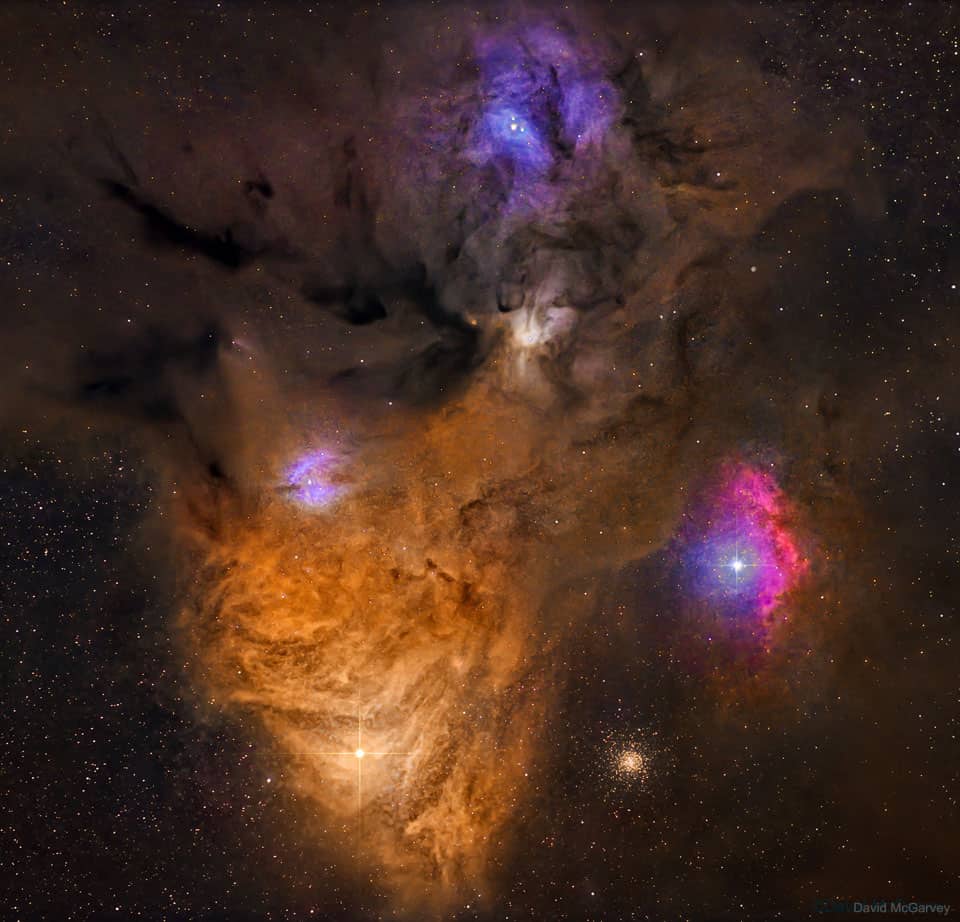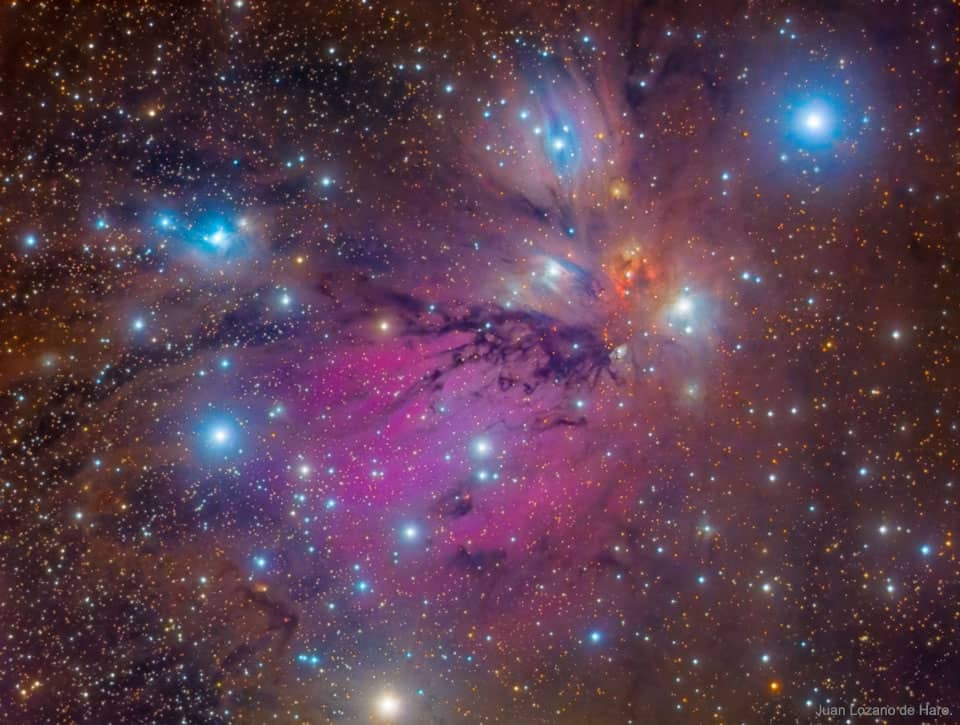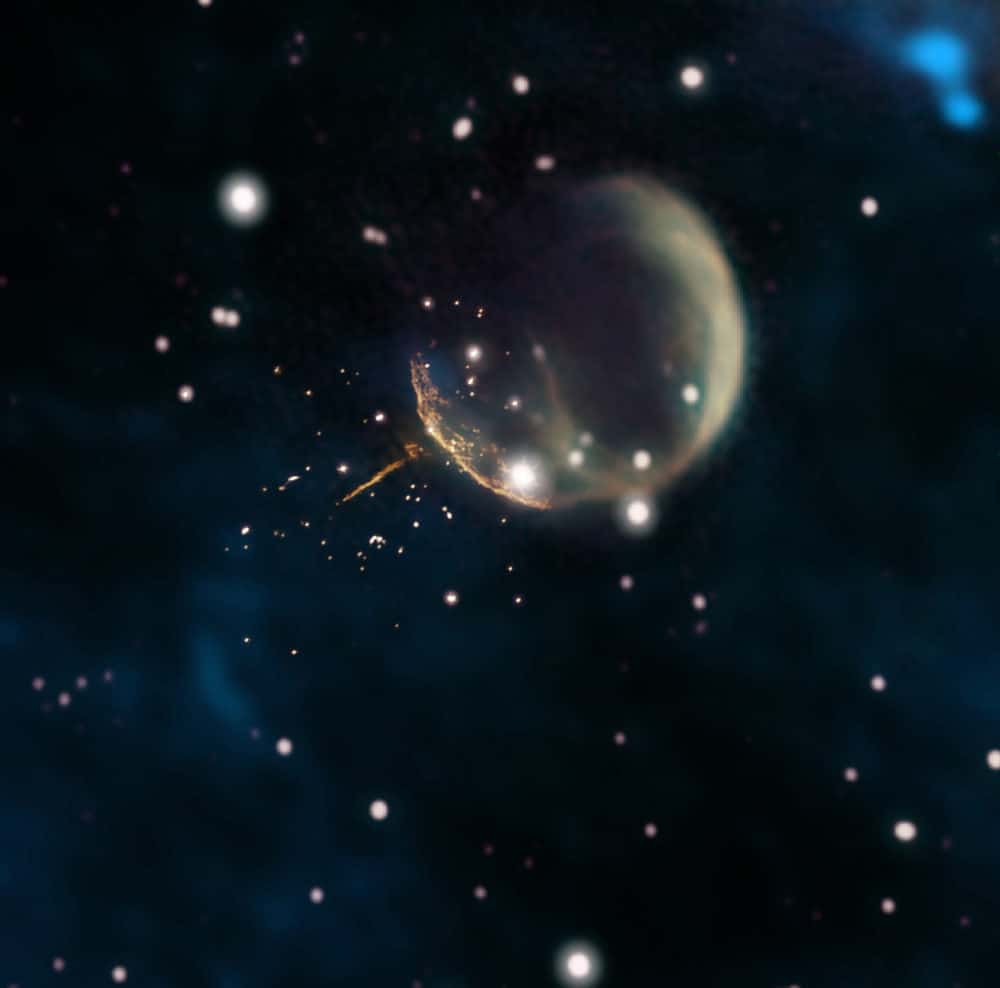Blog
Image data from the Hubble Space Telescope, the European Southern Observatory, and small telescopes on planet Earth are combined in this magnificent portrait of face-on spiral galaxy Messier 61 (M61). A mere 55 million light-years away in the Virgo Cluster of Galaxies, M61 is also known as NGC 4303. It’s considered to be an example of a barred spiral galaxy similar to our own Milky Way. Like other spiral galaxies, M61 also features sweeping spiral arms, cosmic dust lanes, pinkish star forming regions, and young blue star clusters. The bright galactic core is offset to the left in this 50 thousand light-year wide close-up.
more...Philip William Seamen (28 August 1926 – 13 October 1972, Lambeth) was an English jazz drummer.
With a background in big band music, Seamen played and recorded in a wide range of musical contexts with virtually every key figure of 1950s and 1960s British jazz. Notable examples included Joe Harriott, Tubby Hayes, Stan Tracey, Ronnie Scott, Dick Morrissey, Harold McNair, Don Rendell, Victor Feldman, Dizzy Reece, Tony Coe, Tony Lee, and George Chisholm, among others. Later in his career he worked with Alexis Korner and Georgie Fame, and had a spell with Ginger Baker’s Air Force, the leader of the band being Seamen’s foremost disciple. Addiction to alcohol and other drugs hampered his career.
Seamen began playing drums at the age of six, turning professional at the age of 18 by joining Nat Gonella and his Georgians in 1944. He joined the Tommy Sampson Orchestra in 1948, and by 1949, Seamen and tenor saxist Danny Moss had formed a bebop quintet from within the ranks and which was featured on a radio broadcast by the orchestra in September 1949.
He then went on to play in the Joe Loss Orchestra for about 14 months, the most popular dance band of the time. Then the top job with Jack Parnell from 1951 until midway ’54, from 12 to 17-piece band. Seamen was much sought after during the 50s, also playing in Kenny Graham‘s Afro-Cubists projects from 1952 to ’58, from 1954 onwards with the Joe Harriott Quartet, the Ronnie ScottOrchestra and Sextet, and an ever extending list including Dizzy Reece, Victor Feldman, Jimmy Deuchar, Kenny Baker, Vic Ash, Don Rendell, Stan Tracey, Laurie Johnson, as well as blues stars Big Bill Broonzy and Josh White, countless sessions.
more...Kenneth Sidney “Kenny” Drew (August 28, 1928 – August 4, 1993) was an American jazz pianist.
Drew was one of several American jazz musicians who settled in Europe around this period: he moved to Paris in 1961 and to Copenhagen three years later. While he sacrificed much of the interest of the American jazz audience, he gained a wide following across Europe. Kenny Drew was a well-known figure on the Copenhagen jazz scene, recording many sessions with the Danish bassist Niels-Henning Ørsted Pedersen. “Living in Copenhagen, and travelling out from there,” Drew remarked, “I have probably worked in more different contexts than if I had stayed in New York where I might have got musically locked in with a set-group of musicians. This way, I have been able to keep my musical antennas in shape, while at the same time I have had more time to study and also get deeper into my own endeavors.
more...Ustad Vilayat Khan (28 August 1928 – 13 March 2004) was an Indian classical sitar player. Along with Imdad Khan, Enayat Khan, and Imrat Khan, he is credited with the creation and development of gayaki ang (an attempt to mimic vocal music) on the sitar. He recorded his first 78-RPM disc at the age of 8, and gave his last concert in 2004 at the age of 75.
Vilayat was born in Gouripur, Mymensingh in then East Bengal in British India and current Bangladesh. His father Enayat Khan was recognised as a leading sitar and surbahar (bass sitar) player of his time, as had been his grandfather, Imdad Khan, before him. He was taught in the family style, known as the Imdadkhani gharana or Etawah Gharana, after a small city close to Agra where Imdad Khan lived.
more...King Ras John and the Collie Connection Band performing September 7th 3-430pm at the Ethnic Fest 2019 in Walker, MN near Leech Lake. https://business.leech-lake.com/events/details/ethnic-fest-27th-annual-16958
more...The Rho Ophiuchi cloud complex is a dark nebula of gas and dust that is located 1° south of the star ρ Ophiuchi of the constellation Ophiuchus. At an estimated distance of 131 ± 3 parsecs, this cloud is one of the closest star-forming regions to the Solar System
The colors result from a mixture of objects and processes. Fine dust illuminated from the front by starlight produces blue reflection nebulae. Gaseous clouds whose atoms are excited by ultraviolet starlight produce reddish emission nebulae. Backlit dust clouds block starlight and so appear dark. Antares, a red supergiant and one of the brighter stars in the night sky, lights up the yellow-red clouds on the lower left of the featured image. Rho Ophiuchi lies at the center of the blue nebula near the top. The distant globular cluster M4 is visible to the right of Antares. These star clouds are even more colorful than humans can see, emitting light across the electromagnetic spectrum.
more...
Warren Harding “Sonny” Sharrock (August 27, 1940 – May 25, 1994) was an American jazz guitarist. He was married to singer Linda Sharrock, with whom he recorded and performed.
One of few guitarists in the first wave of free jazz in the 1960s, Sharrock was known for his heavily chorded attack, his highly amplified bursts of feedback, and his use of saxophone-like lines played loudly on guitar.
Sharrock began his musical career singing doo wop in his teen years. He collaborated with Pharoah Sanders and Alexander Solla in the late 1960s, appearing first on Sanders’s 1966 album, Tauhid. He made several appearances with flautist Herbie Mann and an uncredited appearance on Miles Davis‘s A Tribute to Jack Johnson.
https://www.youtube.com/watch?v=XiDR87-HRhA
more...Alice Coltrane (née McLeod, August 27, 1937 – January 12, 2007), also known by her adopted Sanskrit name Turiyasangitananda or Turiya Alice Coltrane, was an American jazz musician and composer, and in her later years a swamini. One of the few harpists in the history of jazz, she recorded many albums as a bandleader, beginning in the late 1960s and early 1970s for Impulse! and other major record labels. She was the second wife and the widow of jazz saxophonist and composer John Coltrane. Alice McLeod was born on August 27, 1937, in Detroit, Michigan, and grew up in a musical household. Her mother, Anna McLeod, was a member of the choir at her church, and her half brother, Ernest Farrow became a jazz bassist. With the motivation of her father, Alice pursued music and started to perform in various clubs around Detroit, until moving to Paris in the late 1950s. She studied classical music, and also jazz with Bud Powellin Paris, where she worked as the intermission pianist at the Blue Note Jazz Club in 1960. It was there that Alice appeared on French television in a performance with Lucky Thompson, Pierre Michelot and Kenny Clarke. She married Kenny “Pancho” Hagood in 1960 and had a daughter with him. The marriage ended soon after, on account of Hagood’s developing heroin addiction, and Alice was forced to move back to Detroit with her daughter. She continued playing jazz as a professional in Detroit, with her own trio and as a duo with vibist Terry Pollard. In 1962–63 she played with Terry Gibbs‘ quartet, during which time she met John Coltrane. In 1965 they were married in Juárez, Mexico. John Coltrane became stepfather to Alice’s daughter Michelle, and the couple had three children together: John Jr. (1964–1982, a drummer); Ravi (b. 1965, a saxophonist); and Oranyan (b. 1967, a DJ). Oranyan later played saxophone with Santana for a period of time.
Lester Willis Young (August 27, 1909 – March 15, 1959), nicknamed “Pres” or “Prez”, was an American jazz tenor saxophonist and occasional clarinetist.
Coming to prominence while a member of Count Basie‘s orchestra, Young was one of the most influential players on his instrument. In contrast to many of his hard-driving peers, Young played with a relaxed, cool tone and used sophisticated harmonies, using what one critic called “a free-floating style, wheeling and diving like a gull, banking with low, funky riffs that pleased dancers and listeners alike”. Lester Young was born in Woodville, Mississippi, on August 27, 1909. His mother was Lizetta Young (née Johnson), and his father was Willis Handy Young, originally from Louisiana. Lester had two siblings – Leonidas Raymond, who became a drummer, and Irma Cornelia. He grew up in a musical family. His father was a teacher and band leader, and several other relatives performed professionally.
more...nebula NGC 2170, also known as the Angel Nebula, shines near the image center. Reflecting the light of nearby hot stars, NGC 2170 is joined by other bluish reflection nebulae, a red emission region, many dark absorption nebulae, and a backdrop of colorful stars. Like the common household items that still life paintersoften choose for their subjects, the clouds of gas, dust, and hot stars featured here are also commonly found in this setting — a massive, star-forming molecular cloud in the constellation of the Unicorn (Monoceros). The giant molecular cloud, Mon R2, is impressively close, estimated to be only 2,400 light-years or so away. At that distance, this canvas would be over 60 light-years across.
more...Branford Marsalis (born August 26, 1960) is an American saxophonist, composer, and bandleader. While primarily known for his work in jazz as the leader of the Branford Marsalis Quartet, he also performs frequently as a soloist with classical ensembles and has led the group Buckshot LeFonque. Marsalis was born in Breaux Bridge, Louisiana. He is the son of Dolores (née Ferdinand), a jazz singer and substitute teacher, and Ellis Louis Marsalis, Jr., a pianist and music professor. His brothers Jason Marsalis, Wynton Marsalis, and Delfeayo Marsalis are also jazz musicians.
Leon Redbone (born Dickran Gobalian, August 26, 1949 – May 30, 2019) was a singer-songwriter, guitarist, and actor specializing in jazz, blues, and Tin Pan Alley classics. Recognized by his Panama hat, dark sunglasses, and black tie, Redbone was born in Cyprus of Armenian ancestry and first appeared on stage in Toronto, Canada, in the early 1970s. He also appeared on film and television in acting and voice-over roles.
In concert Redbone often employed comedy and demonstrated his skill in guitar playing. Recurrent gags involved the influence of alcohol and claiming to have written works originating well before he was born – Redbone favored material from the Tin Pan Alley era, circa 1890 to 1910. He sang the theme to the 1980s television series Mr. Belvedere and released eighteen albums.
more...James Andrew Rushing (August 26, 1901 – June 8, 1972) was an American blues and jazz singer, and pianist from Oklahoma City, Oklahoma, best known as the featured vocalist of Count Basie‘s Orchestra from 1935 to 1948.
Rushing was known as “Mr. Five by Five” and was the subject of an eponymous 1942 popular song that was a hit for Harry James and others; the lyrics describe Rushing’s rotund build: “he’s five feet tall and he’s five feet wide”. He joined Walter Page‘s Blue Devils in 1927 and then joined Bennie Moten‘s band in 1929. He stayed with the successor Count Basie band when Moten died in 1935.
Rushing said that his first time singing in front of an audience was in 1924. He was playing piano at a club when the featured singer, Carlyn Williams, invited him to do a vocal. “I got out there and broke it up. I was a singer from then on,” he said.[3]
Rushing was a powerful singer who had a range from baritone to tenor. He has sometimes been classified as a blues shouter. He could project his voice so that it soared over the horn and reed sections in a big-band setting. Basie claimed that Rushing “never had an equal” as a blues vocalist, though Rushing “really thought of himself as a ballad singer.” George Frazier, the author of Harvard Blues, called Rushing’s distinctive voice “a magnificent gargle”. Dave Brubeck defined Rushing’s status among blues singers as “the daddy of them all.” Late in his life Rushing said of his singing style, “I don’t know what kind of blues singer you’d call me. I just sing ’em.” Among his best-known recordings are “Going to Chicago”, with Basie, and “Harvard Blues”, with a famous saxophone solo by Don Byas.
more...Pulsars are superdense, rapidly spinning neutron stars left behind when a massive star explodes. Their rotational periods ranging from more than 10 seconds to just a few milliseconds. Since their discovery in 1967, various surveys have discovered over 2,600 pulsars. PSR J0002+6216 was discovered in 2017 by a citizen-science project called Einstein@Home. Located about 6,500 light-years away in the constellation Cassiopeia, this pulsar spins 8.7 times a second, producing a pulse of gamma rays with each rotation. “This pulsar has completely escaped the remnant of debris from the supernova explosion. It’s very rare for a pulsar to get enough of a kick for us to see this,” said Dr. Frank Schinzel, an astronomer at the National Radio Astronomy Observatory (NRAO). Radio observations with the Very Large Array clearly show PSR J0002+6216 outside the supernova remnant, with a tail of shocked particles and magnetic energy 13 light-years long behind it. The tail points back toward the center of the CTB 1 supernova remnant. “Measuring the pulsar’s motion and tracing it backwards shows that it was born at the center of the remnant, where the supernova explosion occurred. The pulsar now is 53 light-years from the center of CTB 1,” said Dr. Matthew Kerr, of the Naval Research Laboratory. “The explosion debris in the supernova remnant originally expanded faster than the pulsar’s motion,” said Dr. Dale Frail, of NRAO. “However, the debris was slowed by its encounter with the tenuous material in interstellar space, so the pulsar was able to catch up and overtake it.”
more...More Posts
- Gato Barbieri
- Gigi Gryce
- Clarence Fountain
- World Music with Modou Touré
- Daily Roots with Lee Scratch Perry
- Surviving the Pandemic and Realizing Racial Justice
- The Cosmos with Arp 54
- Lyle Mays
- Randy Brecker
- Eddie South
- Jimi Hendrix
- Wilbur Morris
- Flamenco Fridays with Enrique Morente
- Daily Roots with Lion Youth Sound System
- Celebrating All Nations Peoples 2020
- Happy Thanksgiving 2020
- Surviving the Pandemic and Realizing Racial Justice
- The Cosmos with M42
- Tina Turner
- Bob Babbitt




